GOD GIVES ABRAHAM A NEW NAME
A great many people feel that the seventeenth chapter is the most outstanding chapter of the Book of Genesis.
Here God makes a covenant with Abram and confirms His promise to him about a son. He lets Abram know that Ishmael is not the one He promised to him.
In one sense this chapter is the key to the Book of Genesis, and it may be a key to the entire Bible. God’s covenant with Abram concerns two important items: a seed and a land.
He reveals Himself to Abram by a new name—El Shaddai, the Almighty God—and He also gives Abram a new name.
Up to this point his name was Abram; now it is changed to Abraham. Abram means “high father,” and Abraham means “father of a multitude” That Ishmael was not the son God promised to Abraham is the thing this chapter makes very clear.
Genesis 17 describes God’s appearance to Abram, who is now 99 years old. Twenty-three years have passed since God first promised to make Abram a great nation and to give to him and to his descendants the land of Canaan.
During that time, Abram and his large company have lived in different parts of the region. He has grown quite wealthy, and God has appeared to him several more times to restate and expand on the initial covenant promises.
Still, Abram has only one son. Ishmael, born to him by his wife’s servant Hagar, is now 13. Abram and his wife Sarai, who has been barren for their entire marriage, seem to have resisted attempting to have children through other women before the events of Genesis chapter 16.
At this point, they likely assumed that God’s promises and blessing to Abram would pass through Ishmael. After all, at 99 and 89 respectively, they were well past the window for conceiving or bearing children.
That’s when God appears to Abram again. This meeting is different than those earlier encounters, however. This time, in addition to the familiar and seemingly impossible promises, God also has requirements for Abram.
God commands Abram to walk with Him and to be blameless. Abram would, indeed, be the father of nations. Kings would come from him. To confirm that fact, God changed Abram’s name to Abraham.
While Abram means “exalted father,” the name Abraham sounds like the Hebrew phrase for “father of a multitude.” The land of Canaan would belong to Abraham and his descendants forever.
Genesis 17:1-5 KJV
[1] And when Abram was ninety years old and nine, the LORD appeared to Abram, and said unto him, I am the Almighty God; walk before me, and be thou perfect.
[2] And I will make my covenant between me and thee, and will multiply thee exceedingly.
[3] And Abram fell on his face: and God talked with him, saying,
[4] As for me, behold, my covenant is with thee, and thou shalt be a father of many nations.
[5] Neither shall thy name any more be called Abram, but thy name shall be Abraham; for a father of many nations have I made thee.
Genesis 17:1
And when Abram was ninety years old and nine, the LORD appeared to Abram, and said unto him, I am the Almighty God; walk before me, and be thou perfect.
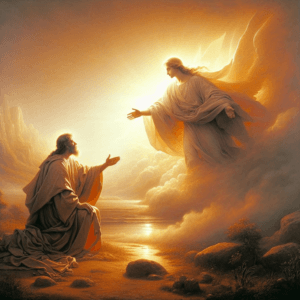 Abram’s story jumps ahead 13 years from the end of the previous chapter. As far as we know, Abram has not heard from God, at least in any special way, since the birth of his son Ishmael to Sarai’s servant girl Hagar.
Abram’s story jumps ahead 13 years from the end of the previous chapter. As far as we know, Abram has not heard from God, at least in any special way, since the birth of his son Ishmael to Sarai’s servant girl Hagar.
The Lord now appears to a 99-year-old Abram who, in his waiting, has decided that perhaps Ishmael is the child of God’s covenant promises, after all. God will make clear to Abram that is not the case.
For the first time in Scripture God refers to Himself as “God Almighty,” as El Shaddai. This is a name meant to establish God’s power on earth, even over nature, and in the life of Abram and Sarai.
God begins this new contact with Abram with two commands: Walk before me faithfully, and be blameless.
Literally, God commands Abram to walk in the Lord’s presence and to be of such good character before God that no valid charge of wrongdoing could be brought against him.
This is unlike other times when God spelled out His promises to Abram. He begins this conversation by placing expectations on Abram to live a life worthy of this covenant relationship with God.
We’re not meant to understand that Abram was sinlessly perfect, or that he could become so. This only means that God expected Abram to center every aspect of his life around honoring the Lord.
Genesis 17:2
And I will make my covenant between me and thee, and will multiply thee exceedingly.
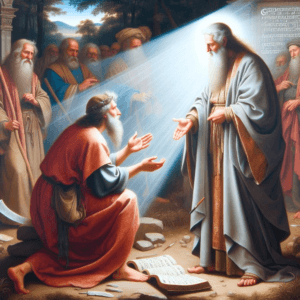 This is the third time God has promised to bless Abram (see Genesis 12:1–3; 15:1–21). In the second blessing, God specifically told him that a son of Abram’s own flesh and blood would be his heir (15:4).
This is the third time God has promised to bless Abram (see Genesis 12:1–3; 15:1–21). In the second blessing, God specifically told him that a son of Abram’s own flesh and blood would be his heir (15:4).
The record then notes the implications of Abram’s belief (15:6). In spite of that faith, Abram had come to believe that he needed to take matters in his own hands.
When Sarai, his wife, suggests he take her servant Hagar as a surrogate wife, he agrees; Ishmael is born as a result.
But the covenant of which God speaks does not involve Ishmael. God will multiply Abram through another son, one yet to be born to Abram and Sarai.
This appearance by God to Abram differs from their previous encounters in the book of Genesis. In the previous verse, God began by placing an expectation on Abram.
He told Abram to walk before Him and to be blameless. God now restates that He will make His covenant between Himself and Abram and will multiply him exceedingly by greatly increasing Abram’s numbers.
The next verses will reveal that Abram received this covenant promise from God very reverently. At the same time, he also wants to understand how this could happen. After all, Abram was 99 years old at this time (Genesis 17:1).
It has been 13 years since the birth of his only child, Ishmael, through his servant Hagar (Genesis 16:16). It has been 23 years since God began making these repeated promises (Genesis 12:4), which do not seem to line up with Abram’s everyday experience.
God has asked Abram to continue to believe. This time, though, God will ask for even more.
Genesis 17:3
And Abram fell on his face: and God talked with him, saying,
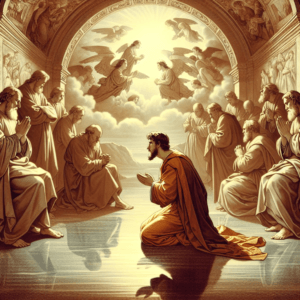 Abram is properly awed by this appearance of the Lord. Whether falling on his face means lying prostrate before God or dropping to his knees and bowing forward is not specified. In either case, Abram shows the respect due to the Lord.
Abram is properly awed by this appearance of the Lord. Whether falling on his face means lying prostrate before God or dropping to his knees and bowing forward is not specified. In either case, Abram shows the respect due to the Lord.
Abram communicated to God that he would receive all that God was saying with humility and great reverence. Although God does not require it of us, many believers today continue to approach God in prayer while kneeling or lying facedown on the ground.
Later, when God provides details on how He will accomplish His promises, Abram will once again fall on his face. At that point, however, it will be in laughter and disbelief.
God’s suggestion that a 99-year-old man and a barren, 89-year-old woman will have a child will be quite a shock (Genesis 17:17).
Genesis 17:4
As for me, behold, my covenant is with thee, and thou shalt be a father of many nations.
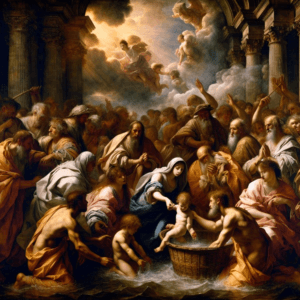 Earlier God had promised to make of Abram “a great nation” (Genesis 12:2). Now the promise is that he will be a father of many nations.
Earlier God had promised to make of Abram “a great nation” (Genesis 12:2). Now the promise is that he will be a father of many nations.
Now God continues the covenant promise. Specifically, God says Abram will be the father of many nations. While God had promised before this to give Abram countless offspring, this is the first time God describes Abram as the patriarch of multiple nations.
It won’t be the last time, though. In fact, in the next verse, God will declare a change in Abram’s name, signifying this great future.
Finally, after 23 years (Genesis 12:4; Genesis 17:1) and many struggles, the man known as Abram will take on the name by which he is truly remembered: Abraham (Genesis 17:5).
It is easy to read this and to see the fulfillment in Israel (through Isaac and his son Jacob), Edom (through Isaac and his son Esau), the nations that descend from Ishmael, and also the nations that descend from Abraham via Keturah (the woman he marries after Sarah’s death; Genesis 25:1–6).
But there is more to the covenant than political nations, since Paul makes clear that Isaac alone is the heir of promise (Romans 9:7).
Thus the nations primarily in view, the ones included in this promise, must come from Isaac, whom Abram will father.
Genesis 17:5
Neither shall thy name any more be called Abram, but thy name shall be Abraham; for a father of many nations have I made thee.
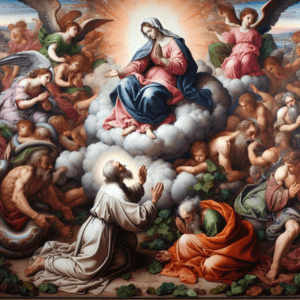 God gives two symbols of the covenant. The second symbol is described in Genesis 17:10–14, below. The first is the name change we see here.
God gives two symbols of the covenant. The second symbol is described in Genesis 17:10–14, below. The first is the name change we see here.
God’s covenant promise was that Abram would become the father of many nations. Now God changes Abram’s name to match this destiny.
After 23 years, and more than 4 chapters of the book of Genesis, the man called Abram will take on the famous name of Abraham (Genesis 12:4; Genesis 17:1).
In modern times, specific names are not always thought to be very important. Parents typically choose names based on how they sound or how they look in writing.
The “meaning” of names, for the modern era, is almost never an important consideration. In ancient times, however, names were often given by parents to describe the lives they hoped their children would fulfill.
In other cases, they were used as declarations of past events. God’s change of Abram’s name at the age of 99 years old was highly significant. The name Abram, given by Abram’s father Terah, means “exalted father.”
It was likely meant to suggest that Abram came from a royal line. This new name, Abraham, sounds similar to the Hebrew phrase meaning “father of a multitude,” exactly matching God’s revelation of what Abram would become.
This name change required another act of faith from Abraham. He would have asked people to call him Abraham—to refer to him as a “father of a multitude.”
Would he feel foolish telling people his new name, as a 99-year-old man with just one son born of a servant girl?
Or would his new name increase his confidence that God’s promise was reliable?
Abram, whose name means “exalted father,” is henceforth to be known as Abraham, which probably means father of many. As God repeats the promise of making Abraham such a father, He speaks as if it is already the case.
I hope that you have really enjoyed this post,
Please Leave All Comments in the Comment Box Below ↓

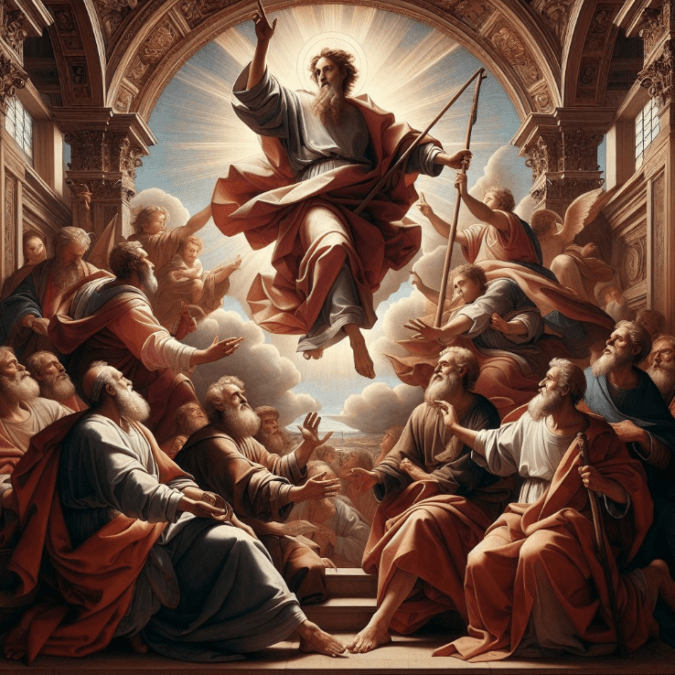











Just a note on the side: I found it interesting that old nations had a cultural thing in calling their children a synonym for what they want and think they will become. Here in Bulgaria, we still do this, but I find it goes away with the younger generation. The source is me, Stefan, it means wreath, and it’s held 3 days after Christmas, on the 27th of December (we have name days here, for all the Bulgarian names). Those symbolic dates and names were put together perfectly by the older generations, and I think this is part of the topic.
You see at 99 years old, now Abraham can go from a father of many to a multiple father. I explain this as a game. If he is Abraham, father of nations, he can be seen as a leader or king, he owns a big domain. And at 99 he can have one more son, which is viewed in that time as heir.
How do we look at children as possibilities, something new and full of potential?
The child can grow and become someone, or surpass me as a parent.
If we use the same way of thought, we can see that now, the father of many, can become the father of kings, the Emperor (we stick to the game rule) the father of multitude.
A captivating story again. This of course isn’t the only option of finding a meaning in the story. Genesis is so cool for that, it has so many core moments connecting to other moments from different parts of the book.
I loved it.
Hello Stefan ivanov,
Thank you for your interest in this HBS & DwJ information platform.
Thank you for stopping by, as well as your participation.
GOD’s Speed To You,
Blessings My Friend!
Hello,
I don’t know if Abraham came from a royal lineage.
But according to the Book of Jubilees, Torah worked for the King of Babylon and made idols for the people. And it’s funny how names reveal your destiny.
Before, his name meant “exalted father”, probably that he was the glory of his father. But now, his name means “father of many”; meaning that he would father many children in the faith.
This is amazing!
Hello angelce903,
Thank you for taking the time to comment on this portion of study and episode.
Blessings My Friend!
The story of Abraham epitomizes the struggle we go through trusting in God.
We’re all excited in Church, or listening to a compelling sermon but when action is required to support the faith… it’s our nature to be doubtful or overthink the process, just like Abraham did.
Trusting the process is one of my favorite sayings and we can use this story as a lesson to do just that – trust HIS process.
Thanks for the Bible Study!
Hello JakeZachary,
Thank you so much for your time. I agree with you 100%. Trusting the process will get us where we should be in life with no strings attached.
You’re Most Certainly Welcome for the Holy Bible Study,
Blessings My Friend!
Your exploration of Abraham’s name change and its significance in the context of God’s covenant is thought-provoking.
It’s fascinating how a change in name symbolizes a deeper spiritual transformation and a renewed purpose.
Have you encountered similar instances in other religious texts where a name change signifies a significant shift in someone’s life or purpose?
I find these symbolic changes across different faiths incredibly intriguing.
In my personal experience, I’ve seen name changes in cultures to mark important life stages or shifts in identity. This connection between a change in name and a change in destiny resonates across various traditions.
How do you think this transformation through renaming correlates with our modern understanding of personal growth and transformation?
Your exploration of these historical and spiritual aspects is enlightening and prompts deeper reflection.
Thank you for sharing this insightful perspective on Abraham’s name change and its spiritual implications!
Hello, and welcome back pasindu.
Name changes, most often given by GOD, establishes a new identity and purpose GOD wants its user to embody.
In the Old Testament we see the changing of names for the purpose of cultural assimilation. Hananiah, Mishael and Azaria had to change their Hebrew names to Chaldean names: Shadrach, Meshach and Abednego.
In the New Testament it was common for a Jew to have two names, one Hebrew and one Greek. In fact, the Apostle Paul never changed his name: Saul was a Hebrew name; Paul was a Greek name.
The name given by GOD is the name that will lead us to GOD’s promises. GOD changed Abram’s name to Abraham, Sarai’s to Sarah, Jacob’s to Israel and Simon’s to Peter. Through those names GOD gave new beginnings, new hopes and new blessings.
Thank you so much for continuing to stop by, and you are welcome for the sharing of this information.
Blessings My Friend!
Hello HBS & DwJ,
Many blessings to you.
I am astounded by the many names and descriptions of the Lord. Like the lyrics to El Shaddai (Almighty Father), El-elyon na adonai (Love worth finding, Please my Lord God most high), Erkamka na adonai (I love you my Lord), Yeshua Hamashiach. The hits keep coming.
So, how could you not believe that God, would bless you with a son, regardless of your age, if you have literally spoken to God. That of course is coming from somebody who wasn’t there.
Jesus spoke to His disciples, there in the flesh, performed miracles for the masses and yet was crucified. I am confused about how people reacted back then. But, I’m not sure what I would do either.
Sorry, got off on a tangent. I love how you broke down each verse, it’s was actually very helpful and revealing. I was browsing your site and will stop in again. It looks like you have a bunch of content stored up.
Thank you,
Respectfully,
Alan aka AbstractAlan
Hello Alan aka AbstractAlan,
There are a lot of changes that must be made, and challenges that must be overcome for growth to begin to take place in order to become any type of example as believers in GOD.
Oh believe me, I really do work extremely hard on making sure I am sharing all of the information I can for those who are trying to study the Holy Bible in depth.
Thank you for your participation, for reading, commenting, and for considering this a website worth visiting.
Many Blessings To You As Well My Friend!